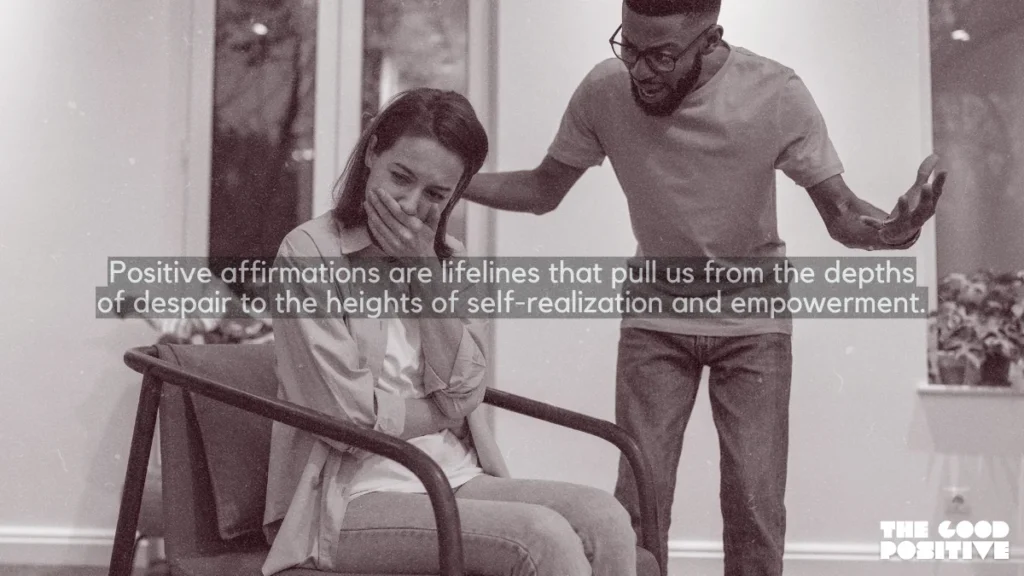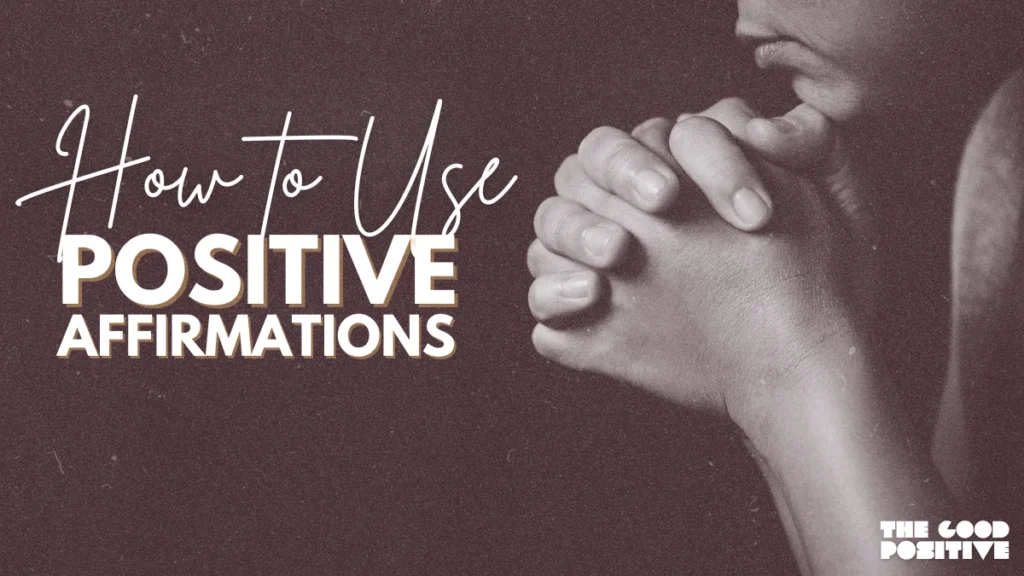Positive Affirmations for Emotional Abuse survivors can be a beacon of light on the darkest of days. Imagine walking through a storm, where every raindrop whispers doubts and fears into your ears.
Emotional abuse, much like that storm, can drown out your inner voice, leaving you feeling lost and alone. But here’s a secret: within you lies a resilient spirit, capable of weathering any storm.
These affirmations are your umbrella, each one a shield against the rain, reminding you of the strength and beauty that has always been inside you.
Let’s embark on this journey together, transforming whispers of doubt into shouts of self-love and empowerment.
Table of Contents
Affirm More: Positive Affirmations for Emotional Regulation.
Why use positive affirmations for emotional abuse?

It’s like planting a garden in a land once scorched by wildfires. The ground, though battered, possesses the potential for new growth, beauty, and restoration.
Emotional abuse leaves behind invisible scars, whispering tales of unworthiness.
Yet, when we sow seeds of positive affirmations, we’re watering the parched soil of our hearts, encouraging resilience and healing.
- Maya Angelou, a literary giant, transformed the narrative of her traumatic past through the power of words, teaching us that rising above our circumstances is not just possible but within reach.
- Oprah Winfrey, who faced a tumultuous childhood marred by abuse, used her story as a catalyst for change, showing how affirming one’s value can propel us from mere survival to thriving.
- Tyler Perry turned his abusive childhood experiences into powerful narratives that not only healed his own wounds but also touched the lives of millions, illustrating the transformative power of storytelling and positive affirmation.
Each of these individuals teaches us that positive affirmations are more than just words; they are lifelines that pull us from the depths of despair to the heights of self-realization and empowerment.
They remind us, in the quiet moments of doubt, that our worth is inherent, unassailable, and eternal.
100 Positive Affirmations For Emotional Abuse

Dive into the healing journey with “100 Emotional Abuse Affirmations,” your personal treasure chest of empowering words.
Picture this: each affirmation, a glowing ember, has the power to reignite the light within you that adversity dimmed.
Imagine, with every day that passes, these affirmations gently lifting the weight off your shoulders, whispering, “You are strong, worthy, and resilient.”
Don’t let this be a fleeting visit. 🔖 Bookmark this page, and let’s embark on a 21-day adventure together, reciting these affirmations daily. Watch as they transform your world, one word at a time.
1. “I am healing from the scars of emotional abuse every day.”
2. “My emotions are valid and deserve respect.”
3. “I am surrounded by love that uplifts and supports me.”
4. “I treat myself with the kindness I deserve.”
5. “My strength is greater than any form of abuse.”
6. “I transform my pain into power and resilience.”
7. “I am a survivor, not a victim, of emotional abuse.”
8. “Every step I take is one toward healing and self-discovery.”
9. “I release the trauma that has been holding me back.”
10. “I refuse to let anyone humiliate me or control my feelings.”
11. “My fear does not define me; my courage does.”
12. “I recognize the signs of emotional abuse and protect my peace.”
13. “I am not what happened to me; I am what I choose to become.”
14. “Criticism does not control how I view myself.”
15. “I am worthy of a relationship filled with respect, not shame.”
16. “I will not let anyone manipulate my reality or emotions.”
17. “My mental health is a priority in all my relationships.”
18. “Friends, family, and co-workers respect my boundaries and well-being.”
19. “I rise above the bullying and maintain my self-esteem.”
20. “I am rediscovering myself free from discrediting or isolating behaviors.”
21. “Silencing my voice is no longer an option for anyone.”
22. “I am breaking free from feeling trapped in toxic patterns.”
23. “My partner supports and understands me, without causing trouble.”
24. “Feeling misunderstood is a sign for me to reevaluate my surroundings.”
25. “I am not defined by feelings of depression or anxiety.”
26. “I am valuable, and my worth is not tied to someone’s inability to see it.”
27. “Healing from emotional abuse is my journey to feeling worthy and loved.”
28. “I no longer dwell in spaces where I am made to feel worthless.”
29. “My emotions are a guide, not a consequence of someone’s actions.”
30. “Love does not criticize, embarrass, or aim to control.”
31. “I embrace the journey of healing, leaving shame and blame behind.”
32. “Manipulation has no place in my life or my relationships.”
33. “I choose to fill my life with people who celebrate my strengths.”
34. “Every day, I grow stronger and more resilient against mental distress.”
35. “My friends and family see me, hear me, and support me.”
36. “Co-worker bullying will not tarnish my self-esteem or professional worth.”
37. “Discrediting my feelings is a red flag I no longer ignore.”
38. “Isolating me from loved ones is a control tactic I recognize and resist.”
39. “Silencing my thoughts and feelings is unacceptable in any relationship.”
40. “Feeling trapped is a signal for me to reassess and make changes.”
41. “Trouble in a partnership prompts me to seek understanding, not blame.”
42. “Being misunderstood is an opportunity for growth and clearer communication.”
43. “Depressed days are part of my journey, not my final destination.”
44. “Anxious thoughts are clouds passing in my sky of self-worth.”
45. “Feeling worthless is a distortion of my true, invaluable essence.”
46. “I am more than the abuse I’ve experienced; I am a beacon of hope.”
47. “I define my self-esteem; no one else holds that power.”
48. “Any form of discrediting my experiences is a reflection of them, not me.”
49. “Isolating me only strengthens my resolve to connect with genuine support.”
50. “Silencing my pain only makes my voice stronger and clearer.”
51. “Feeling trapped is a temporary state; my spirit remains free.”
52. “Partner misunderstandings invite me to deepen our connection through communication.”
53. “Trouble doesn’t define my relationship; our resolve to overcome it does.”
54. “Misunderstood moments lead me to a deeper understanding of myself.”
55. “Depression will not darken the light of my inner strength.”
56. “Anxiety does not have the control over my life that it thinks it does.”
57. “I refuse to feel worthless in the face of distorted perceptions.”
58. “Healing from trauma is my right and my path to freedom.”
59. “I am reclaiming my life from the shadows of emotional abuse.”
60. “My journey is one of love, respect, and kindness towards myself.”
61. “Strength is my response to any form of abuse.”
62. “I transform negativity into a stepping stone for growth.”
63. “Surviving emotional abuse has made me a beacon of hope for others.”
64. “Heal is my mantra, guiding me through self-discovery and beyond.”
65. “Self-love is my shield against any attempt to control or manipulate me.”
66. “My emotions are a source of strength, not weakness.”
67. “I recognize the red flags of abuse and steer my path towards safety.”
68. “Criticism does not define me; my actions and kindness do.”
69. “Embarrassment is a tool of control I no longer empower.”
70. “Shame has no home in my heart as I embrace my truth.”
71. “Blame is a language I no longer speak; I choose understanding instead.”
72. “Manipulation is a sign to reevaluate and strengthen my boundaries.”
73. “My relationships are built on mutual respect and genuine connection.”
74. “Mental peace is my priority, in solitude and in company.”
75. “Friends who uplift me are the family I choose.”
76. “Family ties are strengthened by respect, understanding, and love.”
77. “Co-workers respect me as I advocate for my professional worth.”
78. “Bullying is beneath me; I stand tall in my self-esteem.”
79. “Discrediting my feelings is a reflection of their issues, not mine.”
80. “Isolating tactics only remind me of the importance of my community.”
81. “Silencing my voice only makes me speak louder and prouder.”
82. “Feeling trapped is a signal to find new paths and opportunities.”
83. “My partner is my ally, not a source of trouble or pain.”
84. “Trouble is temporary; our resilience is forever.”
85. “Being misunderstood is a step towards finding my true voice.”
86. “Depressed days remind me to seek light in small joys and victories.”
87. “Anxious moments are fleeting; my calm and peace are enduring.”
88. “Worthlessness is a lie I no longer believe; I am invaluable.”
89. “I navigate the signs of emotional abuse with wisdom and courage.”
90. “Criticism teaches me discernment, not self-doubt.”
91. “Embarrassment and shame are not parts of my emotional vocabulary.”
92. “Blame is replaced with accountability and growth in my heart.”
93. “Manipulative behaviors are clear indicators for me to set firmer boundaries.”
94. “My relationships are reflections of mutual respect and healthy dynamics.”
95. “Mental wellness is the foundation of my interactions with friends, family, and co-workers.”
96. “Facing bullying with dignity reinforces my self-worth.”
97. “Discrediting attempts cannot dim the light of my true self.”
98. “Isolating me from love only draws me closer to those who truly care.”
99. “Silencing my struggles gives me strength to share my story louder.”
100. “Feeling trapped is the beginning of my journey towards liberation and self-discovery.”
How to Use Positive Affirmations for Emotional Abuse?

Embarking on the path to healing from emotional abuse is like nurturing a garden back to life after a harsh winter. Positive affirmations are the sunshine and rain that bring forth blooms from the barren.
Here’s how to cultivate your inner sanctuary in five simple steps:
1. Personalize Your Affirmations: Choose affirmations that resonate with you deeply. It’s like picking out seeds for your garden; not every seed grows in every season. Find the ones that speak to your soul.
2. Integrate Into Your Daily Routine: Let these affirmations be the first rays of sunshine you bask in each morning and the last whisper of the wind at night. Consistency is key, as regular exposure nurtures the seeds of healing.
3. Create a Safe Space: Designate a special nook for your affirmation practice. This could be a cozy corner with cushions, surrounded by your favorite books, or a spot by the window where you can feel the sun’s warmth. Your safe space will anchor the healing process.
4. Use a Mirror: Speaking your affirmations while looking into your own eyes can be powerful. It’s like looking past the winter’s damage to see the green shoots of spring waiting to emerge.
5. Record and Replay: Record yourself speaking your affirmations and play them back during moments of self-doubt. It’s a reminder in your own voice that the season of growth is upon you.
How to Write Effective Affirmations for Emotional Abuse?
Crafting affirmations is akin to writing love letters to yourself. Begin with “I am” or “I can,” followed by a positive and powerful statement that directly counters the negative narrative you’ve been led to believe.
Make them specific, positive, and in the present tense, as if they’re already your reality. This is you, planting the seeds of your future self with every word you write.
Remember, the most potent affirmations are those that make you feel something deeply; they are the ones that water the seeds of change.
FAQ’s

-
What are the affirmations to heal from emotional abuse?
“Every day, I grow stronger and more resilient.” “I deserve love and respect.” These affirmations are like gentle reminders to your heart and soul that you are worthy of kindness and healing, offering a beacon of hope amidst the shadows of past abuse.
-
What is the silent treatment for emotional abuse?
The silent treatment is a form of emotional manipulation where someone refuses to communicate as a means to control or punish. Recognizing it as abuse is the first step; responding with self-care and seeking support can protect your emotional wellbeing.
-
How can positive affirmations help in healing from emotional abuse?
Positive affirmations serve as small steps towards rebuilding your self-esteem eroded by abuse. By affirming your worth, strength, and resilience daily, you begin to overwrite the negative internal dialogue, gradually fostering a more loving and supportive relationship with yourself.
-
What are some effective affirmations to overcome feelings of worthlessness due to abuse?
“I am worthy of love and respect.” “My value is not defined by how others have treated me.” These powerful affirmations counteract the deep-seated feelings of worthlessness, reminding you of your inherent value and strength.
-
Can reciting affirmations daily change my outlook on life after experiencing emotional abuse?
Absolutely. Incorporating affirmations into your daily routine can significantly shift your perspective, helping you to focus on your worth, strength, and potential for the future. It’s a transformative process that cultivates positivity from within.
-
What role do positive affirmations play in recovering from trauma and abuse?
Positive affirmations act as a nurturing voice to counter the harsh criticisms endured from trauma and abuse. They are crucial tools in the healing journey, helping to restore self-esteem, foster resilience, and empower you to reclaim your narrative and identity.
-
How to start using positive affirmations for healing emotional wounds?
Begin by choosing affirmations that resonate deeply with you, perhaps focusing on counteracting negative beliefs instilled by your experiences. Speak them out loud to yourself, preferably in the morning to set a positive tone for your day, and again at night, to end your day on a note of self-love.
-
Are there specific affirmations that help in dealing with the aftermath of emotional abuse?
Yes, there are. Affirmations like “I am worthy of love and respect,” “I release the past and embrace healing,” and “My feelings and emotions are valid” directly address the common feelings resulting from emotional abuse, fostering a sense of self-worth and empowerment.
-
How often should I repeat affirmations to help heal from emotional abuse?
Repetition is key. Aim to recite your affirmations at least twice a day – once in the morning to start your day with positivity, and once at night to reflect and reinforce the positive thoughts before sleep. Consistency will help embed these affirmations into your subconscious.
-
Can positive affirmations improve self-esteem after being emotionally abused?
Absolutely. Positive affirmations can significantly impact your self-esteem by slowly replacing the negative self-talk that often results from emotional abuse. They act as reminders of your worth, resilience, and strength, helping to rebuild your self-view from the ground up.
-
What’s the best way to incorporate positive affirmations into my daily routine for emotional healing?
Incorporate them into moments of your daily routine that are already established, such as during your morning shower, while brushing your teeth, or when commuting. You can also set reminders on your phone to pause and recite your affirmations, ensuring they become a natural part of your day.
-
How do affirmations help in breaking the cycle of emotional abuse in relationships?
Affirmations strengthen your self-esteem and resilience, which are crucial for recognizing and standing up against emotional abuse. They empower you to set healthy boundaries, demand respect, and make decisions from a place of self-love and worth, ultimately helping to break the cycle of abuse.
-
What are positive affirmations after emotional abuse?
“I am moving beyond my past into a future filled with hope and peace.”
“I deserve and now embrace healthy, loving relationships.”
“Every day, I grow stronger and more resilient.”
“I am worthy of love, respect, and kindness.” -
What are positive affirmations for mental health?
“I allow myself to feel my feelings without judgment.”
“I am doing my best, and that is enough.”
“I embrace my strengths and celebrate my victories, no matter how small.”
“I am not alone in my struggles; support and love surround me.” -
What are positive affirmations for anger?
“I acknowledge my anger and seek healthy expressions for it.”
“I am in control of my emotions and choose how I respond to others.”
“Peace and calm flow through me with every breath I take.”
“I forgive myself for my anger and embrace understanding and patience.” -
What are affirmations for narcissistic abuse?
“I reclaim my power and voice from those who have tried to take it.”
“My worth is not determined by anyone’s inability to see it.”
“I am healing and will no longer be defined by manipulation.”
“I trust my intuition and protect my energy fiercely.” -
What are affirmations for manipulation?
“I see through attempts to manipulate me and stand firm in my boundaries.”
“My thoughts and decisions are mine alone and come from a place of strength.”
“I am deserving of honest, respectful interactions.”
“I detach from manipulative energies and focus on my own truth.” -
What are affirmations for sexually abused?
“I am a survivor, defined not by what happened to me but by my courage to heal.”
“My body is my own, deserving of love and respect.”
“I release the shame that was never mine to carry.”
“Healing is my right, and I embrace the journey with grace and strength.” -
What are affirmation for no contact?
“I honor my need for peace and choose environments that support my healing.”
“Removing myself from toxic situations is an act of self-love.”
“I trust the path of no contact as a step towards my well-being.”
“In this space I’ve created, I find strength and renewal.”
Conclusion
And there you have it, a journey through the garden of positive affirmations for emotional abuse, where each word plants a seed of hope and every sentence nurtures growth.
We ventured into this garden together because words have the power to heal, to change lives, and to illuminate the darkest corners of our hearts. Like a personal spellbook, these affirmations are your magic, capable of transforming pain into power.
Why this article, you ask? Because everyone deserves to rediscover their light. So, as you step back into the world, do so with a smile, knowing you’re armed with an arsenal of kindness for yourself.
Here’s to turning scars into stars! 🌟
Affirm More: Positive Affirmations for Empaths.

Aldvin is the proud owner of “thegoodpositive.com.” A passionate writer and supporter of body positivity. Advocate of plus-size fashion. He’s mission is to curate the latest trends and timeless fashion for plus size women. He wants to inspire confidence and creativity through fashion, helping curvy women express their unique personalities with every outfit.

